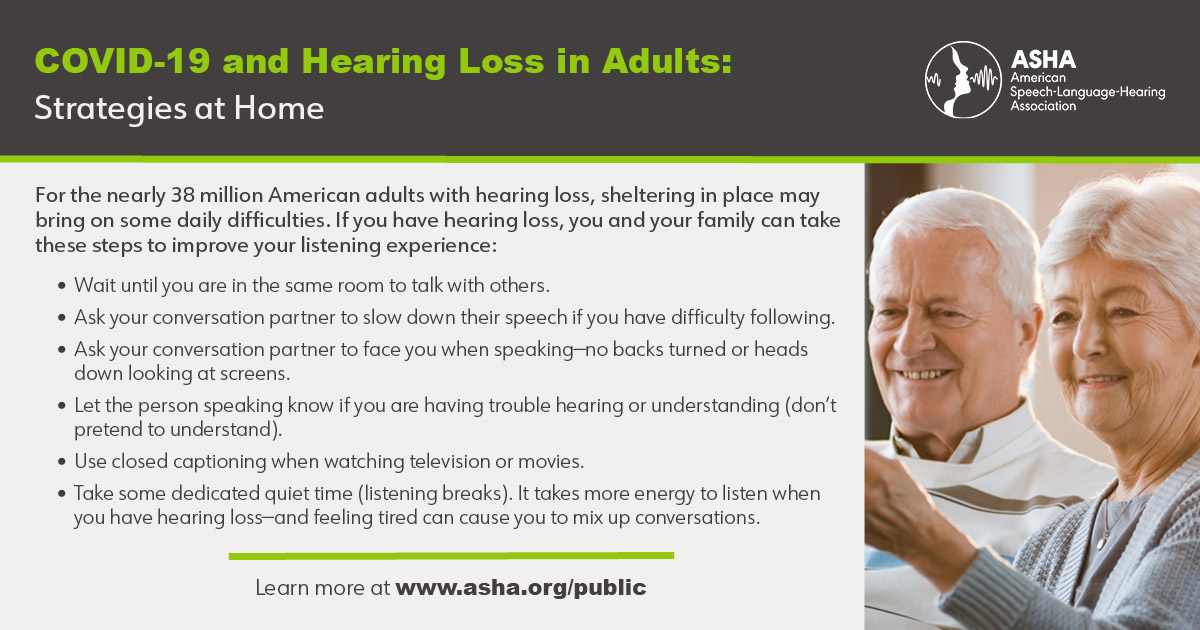COVID-19 and Hearing Loss in Adults: Strategies at Home

COVID-19 and Hearing Loss in Adults: Strategies at Home
For the nearly 38 million American adults who have hearing loss, sheltering in place may bring on some daily difficulties—especially if they have limited access to audiology services due to office closures. ASHA offers this advice to help maintain hearing aids and resolve common environmental issues at home.
Maintaining Hearing Aids
Hearing aids require special care to ensure that they work properly. You should have a hearing aid cleaning brush and a user manual that can assist in performing routine maintenance. Some people have drying jars or canisters provided by their audiologists. If you have one, use it nightly. If you need replacement parts, check with your audiologist to see if these can be shipped to your home during this unprecedented time. To keep your hearing aid in good working order:
- Perform visual checks daily.Take a good look at the whole hearing aid body, starting with the portion that goes directly in your ear. Check for any wax that may be blocking sound from coming in properly. You also should check for cracks on the hearing aid body or tubing.
- If you have an in-the-ear hearing aid, check the wax basket—if you see a good amount of wax, this would be a good time to change it!
- If you have an open-fit hearing aid, check for any wax on the hearing aid dome. Refer to the user manual for tips on how to clean the dome or how to replace it if there is too much wax. Check for breaks in the wire that connects the dome to the hearing aid. If your device has a thin/slim tube but no wiring, remove the dome attached to the tube, and use a thin plastic wire to clean wax and debris from the tubing. You can even use a piece of fishing line to clear a thin/slim tube.
- Check batteries. Batteries should last about 5–10 days, depending on the hearing aid model, the battery size, and the use of connectivity (Bluetooth) options. If you have a battery tester at home, check that the batteries are at full strength so that hearing aids are working at peak performance. If you do not have a battery tester, keep a written log, and note how long your batteries are lasting. Be sure to do the following:
- Always keep spare batteries with you, and store them in a cool, dry place (but not the refrigerator).
- For rechargeable hearing aids: Give hearing aids the recommended number of hours to reach a full charge. Your user manual should provide this information if you need a refresher. Keep a log of how long your hearing aids last. If they are not staying charged as expected, contact your audiologist if you can.
- Clean the hearing aids regularly with a soft, dry cloth. Check for dirt and wax buildup on your hearing aids, earmolds, domes, and/or tubing.
- For hearing aid users who utilize earmolds, note that these can be removed from hearing aids. Once the earmold(s) are detached from the hearing aids, they can be washed in warm (not hot) soapy water, then rinsed well. Make sure earmolds are dry before reattaching them to the hearing aids again.
- Dome-shaped earpieces used with open-fit hearing aids should be cleaned with a dry cloth or special tool provided by your audiologist. Some audiologists may provide a backup supply of domes. If your dome is discolored, cracking, and/or deteriorating, remove it and attach a new dome to your device.
- Minimize moisture in the hearing aids. A hearing aid drying container will help keep moisture from building up inside hearing aids and will lengthen their life. Remove batteries before placing hearing aids in storage containers. If you live in a very humid area, ask your audiologist if a hearing aid drying container is a good idea. There are more sophisticated dryers available if a simple jar or canister drying container isn’t sufficient.
Improving the Listening Experience at Home
By practicing good communication skills, you and your family members can take steps to improve your listening experience:
- Wait until you are in the same room to talk with others.
- Ask your conversation partner to slow down their speech if you have difficulty following.
- Ask your conversation partner to face you when speaking—no backs turned or heads down looking at screens.
- Let the person speaking know if you are having trouble hearing or understanding (don’t pretend to understand).
- Use closed captioning when watching television or movies.
- Take some dedicated quiet time (listening breaks). It takes more energy to listen when you have hearing loss—and feeling tired can cause you to mix up conversations.
Speaking Up About Hearing Loss
For family members: Being at home with loved ones for an extended period of time may make hearing challenges more obvious (e.g., turning the volume way up on the television, complaining frequently about people mumbling). Although now isn’t the ideal time for a hearing evaluation due to shelter-in-place restrictions, you may want to start laying the groundwork for encouraging a visit to an audiologist once it is safe to go out in public again.
Call our Audiologists at 919-595-2000 if you questions or would like additional information.
Source: American Speech-Language Hearing Association



